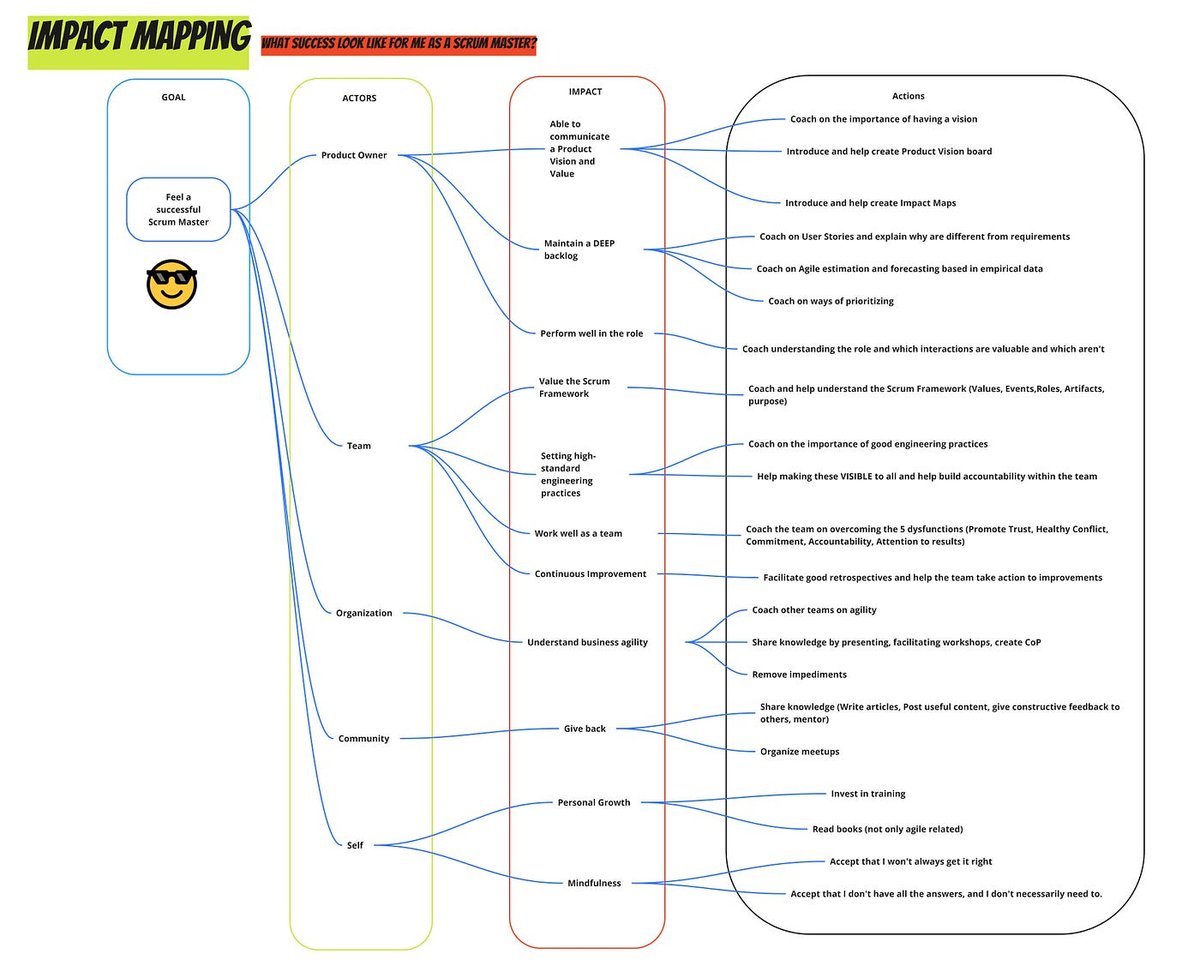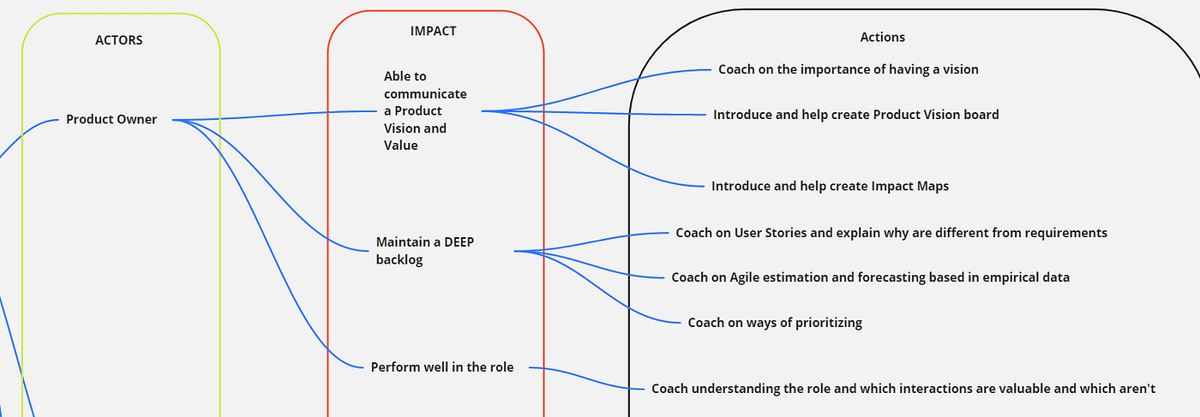This article was originally posted here.
Whether you are a Scrum Master or a Hiring Manager (for a Scrum Master) you should read this to make sure you are set for success for the role of a Scrum Master.
Why does it suck not knowing what success looks like for a Scrum Master?
When a Scrum Master has a hard time defining what success looks like for themselves, several things can happen.
- They have a hard time explaining to their peers and bosses what they do in a logical way.
- Impostor syndrome feeling.
- It gives space for anti-patterns (more on this below) to emerge, by the time the Scrum Master realizes this, it becomes harder to course-correct.
“Would you tell me, please, which way I ought to go from here?”“That depends a good deal on where you want to get to,” said the Cat.“I don’t much care where — “ said Alice.
“Then it doesn’t matter which way you go,” said the Cat.- Lewis Carrol, Alice’s Adventures in Wonderland
Then, why is it necessary knowing what success looks like?
Simply because it feels right, it feels like having a sense of purpose and a mission.
It’s like having a north star guiding us towards what we want to achieve and this is necessary to become a great Scrum Master useful to the organisation they serve.
How do I define what Success looks like for me?
One day I was listening to Vasco Duarte Scrum Master Toolbox podcast and he usually asks his guests….
Update: Since then I have been a guest to the podcast, you can listen to my episodes here
So tell me what does success looks like for you as a Scrum Master? — Vasco Duarte
And while some guests have it figured out, many have a hard time giving an answer. And I guess that’s because it is difficult to express what success looks like in a simple sentence, specially if one has never given a serious thought about it before.
That prompted me to chart “What Success looks like for me?”.
As I started thinking about it, it became crystal clear that my success as a Scrum Master is inherently connected with the success of the people I serve.
I decided then to draft an Impact Map to help me discover what success looks like.
As I started thinking about it, it became crystal clear that my success as a Scrum Master is inherently connected with the success of the people I serve.

Impact Mapping exercise identifying the actors and impacts that defines my success as a Scrum Master — Image by Wilson Govindji
To draft my Impact Mapping I followed the steps below:
- Define the goal — I started with the first and most important node that defines the Goal, and that is “Feel a Successful Scrum Master”, I intentionally wrote “feel” and not “be”, because for me success is more as a feeling.
- Find the actors — This is about discovering who are the people (individual or collective) that contributes for my success, I found that those were the Product Owner, the Team, Organization, Community and myself.
- Impacts — The next step was finding which “Impacts” I seek for those actors that directly contributes to my goal.
- Deliverables — These are the things I need to do in order to drive the impact I seek for that actor.
While neither this is an exhaustive list of things nor limited to those only, they are just some I believe at this moment in time are important to my goal — “Feel a Successful Scrum Master”.
What does Success looks like for me?
This exercise helped me discover who are the Actors that contribute for my success, what Impacts I want them to have and finally what are the things I need to do (which only depends on me) to drive that impact.
Actor: Product Owner
Product Owner (PO) is a key player for my success, I always guide them to create a Vision and communicate that Vision, it’s also important that the PO understands how critical it is to maintain a tidy product backlog, the right amount of detail that enables the team to understand the intent (What) but not detailed enough that constrains the team on the implementation (How), for new PO transitioning from traditional roles as Project Managers I feel is important for them to let go of the “artificial” certainty around dates and embrace empiricism, agile ways of estimation and forecasting.

Product Owner / Impacts / Actions — Image by Wilson Govindji
Actor: Team
The team is the actor I spend the most time with, so it’s important that I coach them in what Scrum is, what the roles are, the meaning of the events and the artifacts, for less mature teams while the individuals may know best engineering practices they may not understand why it’s important to have them visible and agreed as a team.
Teams are composed by human beings and each human being is different, so when people come together the team always goes through some phases as explained by Bruce Tuckman with his Tuckman Model, as they form and storm many dysfunctions start emerging, they are very visible to the Scrum Master that is standing a step away from the team and have a holistic view over their actions and interactions. That’s when I use the 5 Dysfunctions of a Team as a model to help fix these dysfunctions along with the team.

Team / Impacts / Actions — Image by Wilson Govindji
Actor: Organization
This is where I feel many Scrum Masters fall short, they avoid going beyond the team level.
The second most valuable currency for the Scrum Master is Influence which is only trumped by Trust
One of the values of Scrum is Courage and stepping outside the circle of the team is beneficial for several reasons. I will mention just few:
- Understanding the environment around the team — This allows me to help my team more effectively, understanding the business unit and the other teams around, creating and foster relations with other people can go a long way — the second most valuable currency for the Scrum Master is Influence which is only trumped by Trust.
- Help other teams and individuals — There’s no problem at all to help other teams and coaching individuals, I do many 1-2-1 coaching sessions with anyone who is in need inside my organization, regardless which country, area of business they belong and irrespective of their role.
- Offer presentations, workshops, agile clinics — If there’s something I love doing is sharing knowledge, the best way of doing it is to regularly host sessions about anything agile for the whole organization, this helps accelerate the agile mindset adoption.
- Working with the HR — In organizations going thorough an agile transformation the HR is usually leading transformation initiatives, they always appreciate help from passionate Scrum Masters that are willing to go the extra mile.

Organization / Impacts / Actions — Image by Wilson Govindji
Actor: Community
When I started to shift my career towards Scrum Mastery I benefited so much from the several agile communities such The Scrum Master Clinics organized by Tobias Mayer (author of the book “The People’s Scrum”) at London, many meetup groups I’ve attended, articles and blogposts written and shared by more experienced folks than I was at the time.
In the end of 2019 I decided to create my own meetup group in Newbury — UK called Newbury Agile Group. As we entered 2020 the world was hit by a pandemic and therefore I had to shift towards remote meetups, since then I got the chance to have hosted great names in the agile community such as Geoff Watts (author of the book “Scrum Mastery: From Good To Great Servant-Leadership”), Roman Pichler (author of the book (“Agile Product Management with Scrum”), Allan Kelly (author of the book “Xanpan” and most recently “Succeeding with OKRs in Agile”) and many others.
Creating the meetup, organizing events, writing blogposts, give training and coaching is one way of giving back to a community that has given so much to me.

Community / Impacts / Actions — Image by Wilson Govindji
Actor: Self
It would be weird if I weren’t playing a big part as being responsible for my success.
I feel the Scrum Master role is evolving and therefore I feel that I need to evolve constantly, that’s not a problem for me because I love to learn new things and experiment them, I like to invest my time in attending relevant training, attending meetups, reading books, listening to podcasts and putting to practice what I learn and check what worked and what didn’t.
Someone told me that I should take it easy and take time to disconnect, however I don’t see my work as a job from 9–5, I see it as a passion and when someone is passionate there’s no such thing as disconnecting — yes I do like to spend time with my family, connecting with friends and doing other stuff but my point is… what I do is my Ikigai and when someone is really passionate and committed to invest in themselves there are more chances to feel successful and fulfilled.

Self / Impacts / Actions — Image by Wilson Govindji
Common Anti-Patterns that occurs when your definition of success is fuzzy.
What happens when someone doesn’t know what success looks like for them as a Scrum Master?
First and foremost the role of the Scrum Master becomes a shell for other roles that aligns more to past roles performed by the Scrum Master and secondly creates the right environment for anti-patterns to start emerging and this may very well be by the influence of external people (specially by the Hiring manager that had a very weak understanding of the role in the first place).
Some anti-patterns I have observed:
- The Scrum Task Manager — the Scrum Master acts like a manager, telling (they think they are suggesting) the team what to do, by assigning things to them.
- The board admin — the Scrum Master updates the board rather than coaching the team to do it themselves, it’s their board, not the Scrum Master’s board.
- The secretary — The Scrum Master that basically books meetings and does errands for the team.
- The clown — The Scrum Master that thinks his/her job is to cheer up the team by innovating every single sprint with different type of retrospectives, starting every meeting with funny ice-breakers but not providing much more value for the team.
- The spy — the Scrum Master that is keeping tabs on the Scrum Team and secretly spying on behalf of the manager.
- The Human Shield — The Scrum Master that takes “protecting the team” excessively to the letter and doesn’t allow any interaction from inside or outside without going through him/her — I do feel that most of interactions should be dealt by the team, only if it starts to hinder the well functioning of the team then the Scrum Master should intervein to restore harmony.
- The Scrum Police — The Scrum Master that thinks their reason for existence is to enforce every rule of the Scrum (or any other framework) upon the team, they lack the power of adaptation to the context surrounding them and their team, this ultimately leads to erosion of trust between the Scrum Master and the team.
Summary
As I mentioned Success is a more a feeling rather than an end-state and therefore is quite subjective.
What I offered here is a way for me to define what it feels for me to be a successful Scrum Master, as I went through this thought process I understood:
- Why it’s important for me to define What Success Looks like.
- Discovered a way to map it out using an Impact Map.
- Who are the actors that influence my success.
- What anti-patterns I have seen from people that misunderstood the role and can’t define success in a way that is aligned with what Scrum truly is and somehow captured in the Scrum Guide (the guide is also a starting point, not an extensive and detailed view of what the Scrum Master role looks like)







